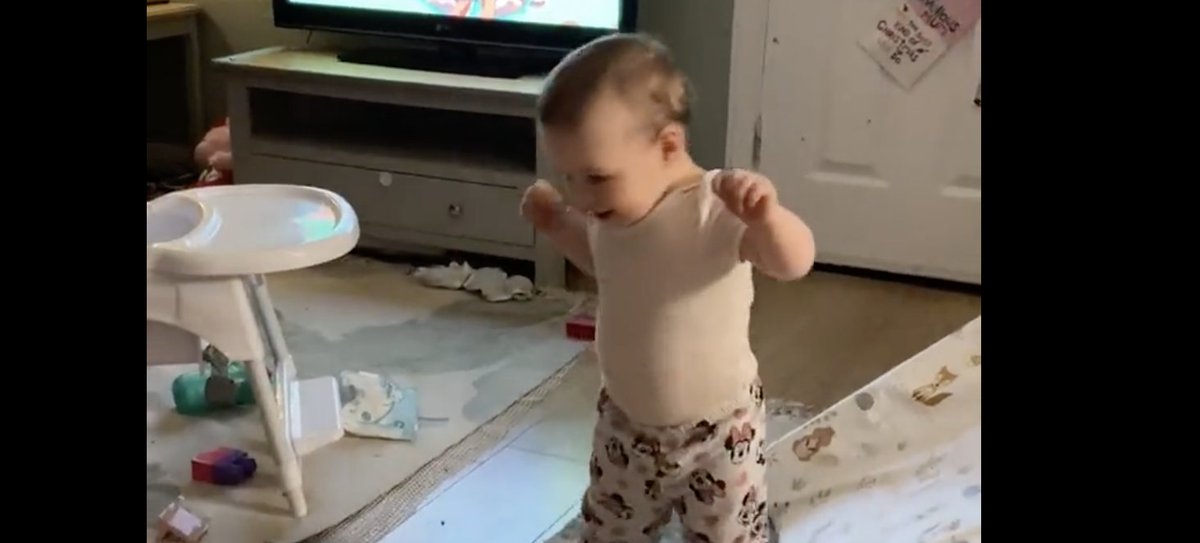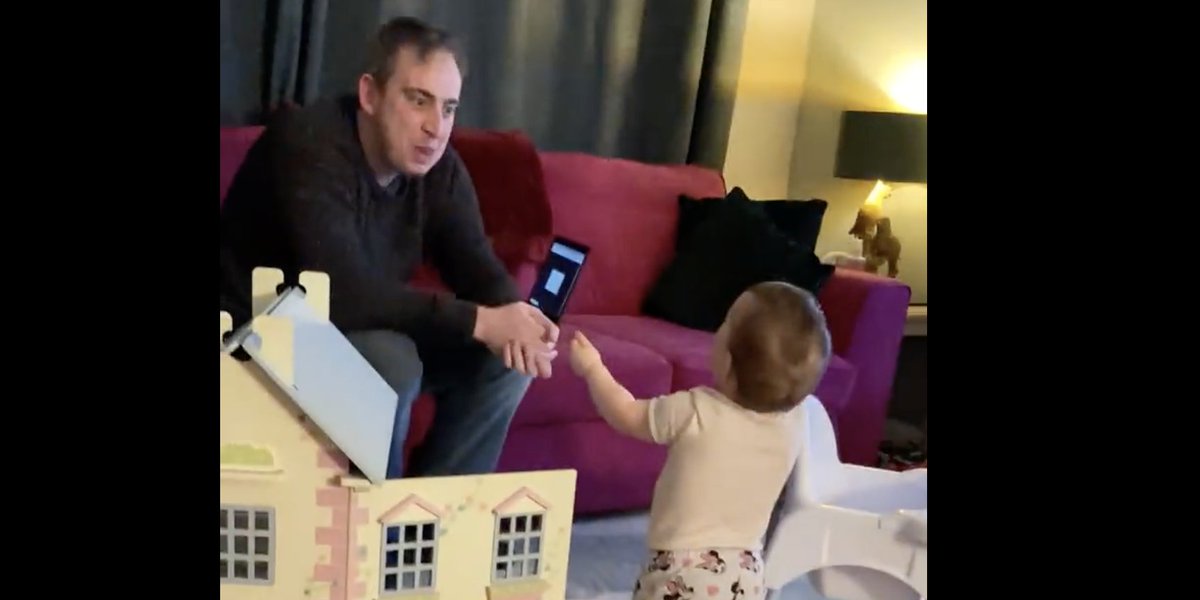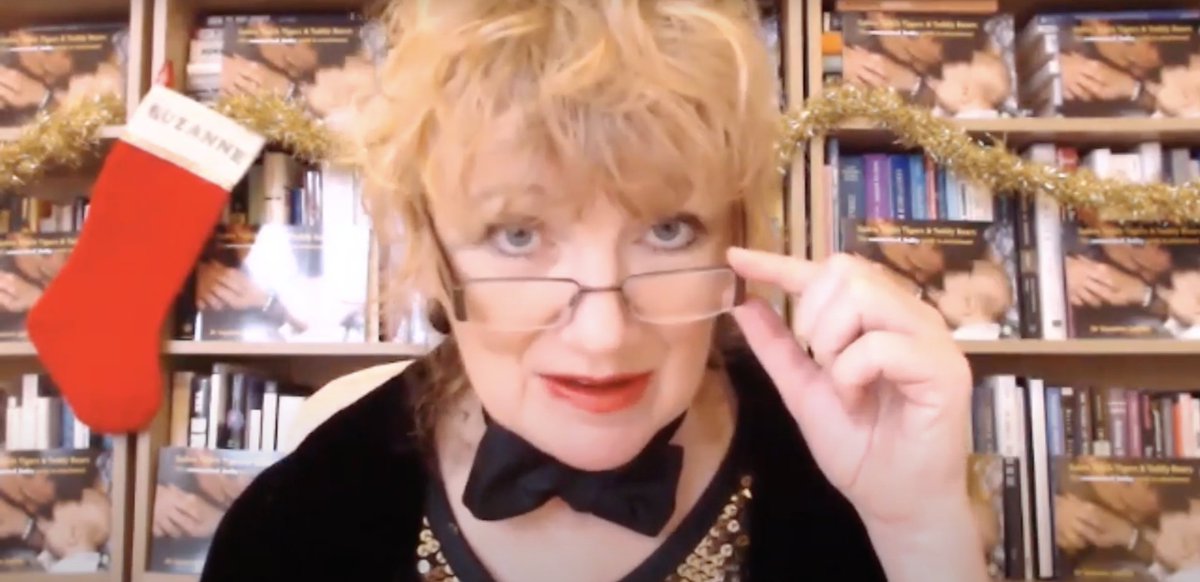
I want to welcome 2022 in t same way I saw out 2021: by reflecting on the magnificence of a baby starting to walk. It is so much more significant than even proud parents may realise.
A THREAD on human potential.
Thank you @AshleyCScotland & @Frankie_Toner1 for t opportunity.
A THREAD on human potential.
Thank you @AshleyCScotland & @Frankie_Toner1 for t opportunity.
https://twitter.com/AshleyCScotland/status/1476672622519848968
2. Listen to t delight of mum @AshleyCScotland as she witnesses t moment her wee girl stands up & walks "all by herself". That joyous pride? "You clever girl!" Mum's voice MARKS this moment as a major life transition. And it is - occurring right there in an ordinary living room.
3. Okay, here's a fascinating insight. Look! This is her very first walk about on her own ever! And, somehow, her body knows how to help her stay balanced! How?? "Hold out your arms, Lass. Keep them evenly spaced."
HER BODY KNOWS TO DO THIS! Without any teaching!
HER BODY KNOWS TO DO THIS! Without any teaching!

4. Look! Its not just a 'motor-movement event'. Its a SOCIAL EVENT! She can coordinate t new movement of her feet WITH HER EYE GAZE! "Mum, are you watching?" She looks directly up at her mum to SHARE THE MOMENT. (And Mum? She soooo does celebrate it.) That's a sense of BELONGING. 

5. Oooh! Risk coming up! The edge of that rug makes this an uneven surface! How do new walking muscles cope with that? By altering the orientation of her arms! HER BODY CAN DO THIS SPONTANEOUSLY. All on its own. No teaching. Her body comes with its own wisdom. 

6. Did you catch the wee smile? That's what Prof Colwyn Trevarthen calls a smile of pride. Babies have an intuitive sense of achievements, and they experience pride in them. Its just...they want someone with whom to SHARE the joy of those moments. Like I said: That's belonging. 

7. And at the end of that stroll? She looks up at her Daddy, straight into his eyes, ADJUSTING HER POSTURE so that she can look up & SHARE this moment with him. "I have arrived, Daddy!" And his gaze is right there to meet hers. BELONGING. 

8. So much goes on in developmnt that we miss. It happens too fast in real life. And we might not even know it matters. Yet t profound moments are right there, in front of us. (Imagine a child taking their first steps with no-one to celebrate with...) Here's more frm t research:
9. Here's Prof Colwyn Trevarthen writing 2005 abt that smile of pride. "Infants are born w/ a bold self-consciousness, one that soon takes responsiblty for independnt acting - which feels pleasure in the approval of others & shame at failure before them." researchgate.net/publication/29…
10. Here's resrchrs at New York Univ in 2014 reminding us that crawling & walking infants see very different worlds! "Infants' visual experiences are intimately tied to their posture." This is obvious, but not something most of us ever stop to think on. ncbi.nlm.nih.gov/pmc/articles/P…
11. And here's Italian research from 2016 that shows something almost funny. PARENTS see the world differently too! Mums DRAW tables as a different size once they have a walking baby on their hands. Their perception of danger in the world alters.
frontiersin.org/articles/10.33…
frontiersin.org/articles/10.33…
12. Once babies can walk, the way they get their parents' attentn changes. 2011 study. Walkers made more social gestures, compared to crawlers. In fact: "Learning to walk lies at the core of system-wide changes across many developing domains." MAJOR SHIFT! digest.bps.org.uk/2011/02/28/for…
13. And here's a bang up to date 2021 study that confirms that a baby's environment makes a difference to the skill. Time & space to practice matter. "Less crowded homes." "Reduced constraints." These will matters for childcare settings as well as homes.
onlinelibrary.wiley.com/doi/10.1002/de…
onlinelibrary.wiley.com/doi/10.1002/de…
14. And evolutionarily? When our ancestors began walking on 2 legs instead of 4? That changed everything - including t tilt of t pelvis & birth canal. That's when our babies, w/ big skulls, began to be born earlier, w/ vulnerable brains & stress systems. ncbi.nlm.nih.gov/pmc/articles/P…
15/end. It is 1st Jan 2022.We enter a new life chapter. So does evry baby t moment they stand up &walk. I hope ths thread helps Sophia-Grace's parents to see even more richly t power of t LOVE they offer her. I hope othr parents will find it fascinatng too.
Happy New Year, all.xx
Happy New Year, all.xx
@malseed_natalie @paulinescott222 @sallycroachy @JANEOROURKE @janeleavey @drrosieknowles @KeeganSmith_Law @ScotParents @meljanestuart1 @Lorrain05617625 @childinmind @margl43 @haynes_wiley @LauraHAllain @kymscott5 @UpstartScot @donnaadamsx @TheBabyExpert @SupportfrmStart
@annanewell @rhonamatheson @Dr_Pam_Jarvis @ListenToKids @ParentShow @yesparenting @ParentingFFutur @_LisaCherry @LisaReagan3 @RobinCogan @bvcpantarhei @eperryinsights @elleenelle @janehmul @Prev_Justice @DadsRockOrg @DADSWORK @CraigmillarBFB @BeSmartBaby1 @grahammusic1
• • •
Missing some Tweet in this thread? You can try to
force a refresh






